I am a complete beginner so if the question seems obvious or stupid I apologize beforehand.
Working on an app in PyGame that reads a random word from a file and then searches it's definition using PyDictionary.
The code I started with is as follows;
WORD = random.choice(WORDS)
dict = PyDictionary()
meaning = dict.meaning(WORD)
the word is printed on screen without issue;
word_text = play_again_font.render(f"{WORD.upper()}", True, "#FFB90F")
but when I try to call the meaning I get;
meaning_text = meaning_font.render(f"{meaning()}", True, "#FFB90F")
TypeError: 'dict' object is not callable
As I found the PyDictionary was sending the output as dict which is indeed not callable.
So I tried a new approach.
My new code is; I have a python file with a WORDS list
WORD = WORDS
WORD_LIST = list(WORD)
word_n = random.choice(WORD_LIST)
I send the random word, defined in the variable word_n, to a txt file:
file = open('test.txt', 'wb')
pickle.dump(word_n,file)
file.close()
As the word has special characters and white spaces I read, clean and send to another file;
def clean_word():
string = open('test.txt').read().lstrip().strip()
new_str = ''.join([i for i in string if i.isalpha()]).strip()
open('mean.txt', 'w').write(new_str)
def get_mean():
clean = open('mean.txt').readlines()
dicto = PyDictionary()
meaning = dicto.meaning(clean)
The join function works in as far as it removes white spaces (NUL) and so, but it leaves this character before the word: œ these characters get removed: €EOT•ENONULNULNULŒSOHo”.
I've tried:
new_str = ''.join([i for i in string if i.isalpha()]).strip().replace('œ','')
This does not work as the œ symbol remains at the beginning of the word.
I've read that it could be encoding so tried:
new_str = ''.join([i for i in string if i.isalpha()]).strip().encode('utf-8')
also tried .encode('cp1252') but neither method works. Tried decode but this doesn't appear to be an option.
Right now I cannot send the word to PyDictionary as it returns "None".
meaning_text = meaning_font.render(f"{clean_word()}", True, "#FFB90F")
I'm assuming this is due to the symbol in front of the word.
How can I strip everything to be able to pass the variable to PyDictionary?
EDIT
This does not appear to be encoding.
I kept trying and have found that the word does get passed to PyDictionary and that it does produce a definition.
I have tested by;
def get_mean():
clean = open('mean.txt').readlines()
dicto = PyDictionary()
meaning = dicto.meaning(clean)
print(meaning)
The meaning is indeed shown on Terminal.
Another test I did was:
def get_mean():
clean = open('mean.txt').readline()
dicto = PyDictionary()
meaning = dicto.meaning(clean)
file = open('meaners.txt', 'wb')
pickle.dump(meaning, file)
file.close()
I can confirm that the file meaners.txt gets created meaning gets sent to it.
Why am I able to pass the variable word_n but not get_mean?
ie.
the below works and renders the word as expected;
play_again_font.render(f"{word_n.upper()}", True, "#FFB90F")
But this does not work:
meaning_text = meaning_font.render(f"{get_mean()}", True, "#FFB90F")
It always returns None even when the definition gets sent to the created file.
If I try to create a variable ie;
my_var = get_mean()
I get error;
meaning_text = meaning_font.render(f"{my_var()}", True, "#FFB90F") TypeError: 'NoneType' object is not callable
if I call the function directly it returns None;
meaning_text = meaning_font.render(f"{get_mean()}", True, "#FFB90F")
Do I need to redirect stdout perhaps?
Thanks in advance.
EDIT;
minimal reproducible example:
I have a words.py file which contains:
WORDS = [ "a", "bunch", "of", "words", "bared" ]
import random import pickle import words from PyDictionary import PyDictionary import pygame import pygame.display
WORD = words.WORDS
WORD_list = list(WORD)
word_n = random.choice(WORD_list)
file = open('mean.txt', 'wb')
pickle.dump(word_n,file)
file.close()
print(word_n)
def get_mean():
dicto = PyDictionary()
meaning = dicto.meaning(word_n)
print(meaning)
file = open('meaners.txt', 'wb')
pickle.dump(meaning, file)
file.close()
get_mean()
test.py" bared {'Verb': ['lay bare', 'make public', 'lay bare'], 'Adjective': ['having the head uncovered']} {'Verb': ['lay bare', 'make public', 'lay bare'], 'Adjective': ['having the head uncovered']}
Process finished with exit code 0
The issue I'm facing is when I try to render text with the get_mean() The word_n variable is displayed without problems.
test_text = play_again_font.render(f"{word_n.upper()}", True, "#FFB90F")
test_rect = test_text.get_rect(center=(WIDTH / 2, 650))
The above works and the random word is displayed on screen.
But the below, displaying the get_mean() does not display the definition.
meaning_font = pygame.font.SysFont('segoe-ui-symbol.ttf', 20)
meaning_text = meaning_font.render(f"{get_mean()}", True, "#FFB90F")
meaning_rect = meaning_text.get_rect(center=(WIDTH / 2, 200))
